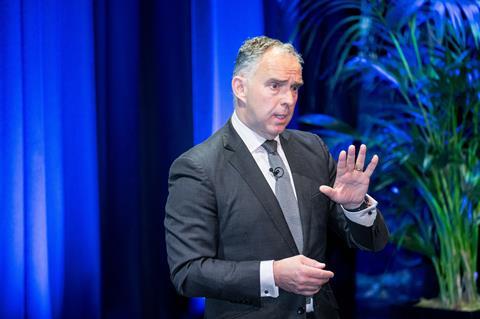Current tensions stress the importance of understanding supply chain exposures, Lord Sedwill, a cross-bench peer from the UK’s upper house of Parliament, told the Marsh McLennan Rising Professionals’ Global Forum 2024.
The volatile geopolitical risk environment is putting greater pressure on global supply chains and their insurance exposures, emphasised a cross-bench peer from the UK’s House of Lords to the Marsh McLennan Rising Professionals’ Global Forum 2024.

Lord Sedwill is a non-executive director of Lloyd’s, as well as BAE Systems, and a supervisory board member at Rothschild, and chairing its Saudi Arabia and geopolitical advisory business.
He was speaking spoke to more than 800 young insurance market professionals about “Navigating global political turbulence. Understand. Plan. Advance”.
“One of the features of globalisation that we haven’t really understood is market concentrations,” Sedwill (pictured) said.
“It’s fairly obvious in three key areas: critical minerals, where China has a monopoly on refining and production of 70-95%; semiconductors, where the two most important suppliers in the world are Taiwan and South Korea; and digital data, where American tech companies are dominant, and are under pressure from regulators in the US and Western Europe,” he said.
“If you’re thinking about the companies you insure, and about how you price risk, do those companies really understand their supply chains, have they thought about how they’re going to diversify those supply chains, have they invested in cyber protection, have they ensured they are resilient?,” he added.
He outlined what he saw as the three biggest issues to dominate the political discourse over the coming decades.
The first of these is environmental challenges relating to climate change, biodiversity, plastics in the oceans, and anti-microbial resistance.
The second was socioeconomic issues, from the technological revolution of AI, quantum computing and fusion energy, to challenges thrown up by migration, the retreat from peak globalisation, and the global capital imbalance; and geopolitical tensions.
Focusing on the third of these, the peer said: “Unless we can manage geopolitical tensions, we aren’t going to be able to create the architecture internationally to manage the environmental challenges and socioeconomic challenges, which will require even greater international collaboration than previously.”
Sedwill broke down geopolitical trends into three primary areas: deepening rivalry between the US and China; the resurgence of non-alignment with these two political blocs; and the emergence of current and developing crises.
“I strongly recommend that you, like your clients, keep a close eye on these issues and understand their real impact,” he said.
He noted that at a recent security conference in Singapore, while the US stressed it wanted to stabilise relations with China, it would simultaneously stay close to its allies in trying to contain China’s expansionist tendencies.
Meanwhile, he said, China suggested the US was tending towards hegemony by trying to contain China, and should back off from interference in the Asia-Pacific region. However, he noted, both the US and China recognise the escalating tension and are determined to avoid confrontation.
The peer also highlighted the phenomenon of prominent countries such as Brazil, India, South Africa, Saudi Arabia, and Indonesia that are becoming less inclined to side with either camp.
“It’s easy to think the entire world is crystallising into two blocs, where everyone has to make a choice between one corner or other. But actually, most of the world want positive relationships with both,” he said.
“These are really big countries where China and the US are competing for influence, and China actually is doing a better job of this because they’re more active, more engaged. One of the lessons for Western democracies is that we need to get back into the game of competing for influence and engagement, but in a way that is respectful of their interests.”
Out of the key crisis areas in the world currently – Ukraine, Gaza, and the Sahel region of Africa – he noted that the latter represented a growing challenge for global business because of the concentration of rare earth minerals and other key commodities.
He also highlighted the West Pacific as a region to watch over the next two decades, notably the tensions in the Korean Peninsula, China’s relationship with Taiwan, and clashes in the South China Sea between China and the Philippines.
“It’s worth noting that a third of the world’s trade goes through the South China Sea, and much of that through the Malacca Straits,” he said. “The key conclusion to draw from all this is to know and understand your supply chain. If you’re in manufacturing, dependence on China is in just about every supply chain going.”










No comments yet